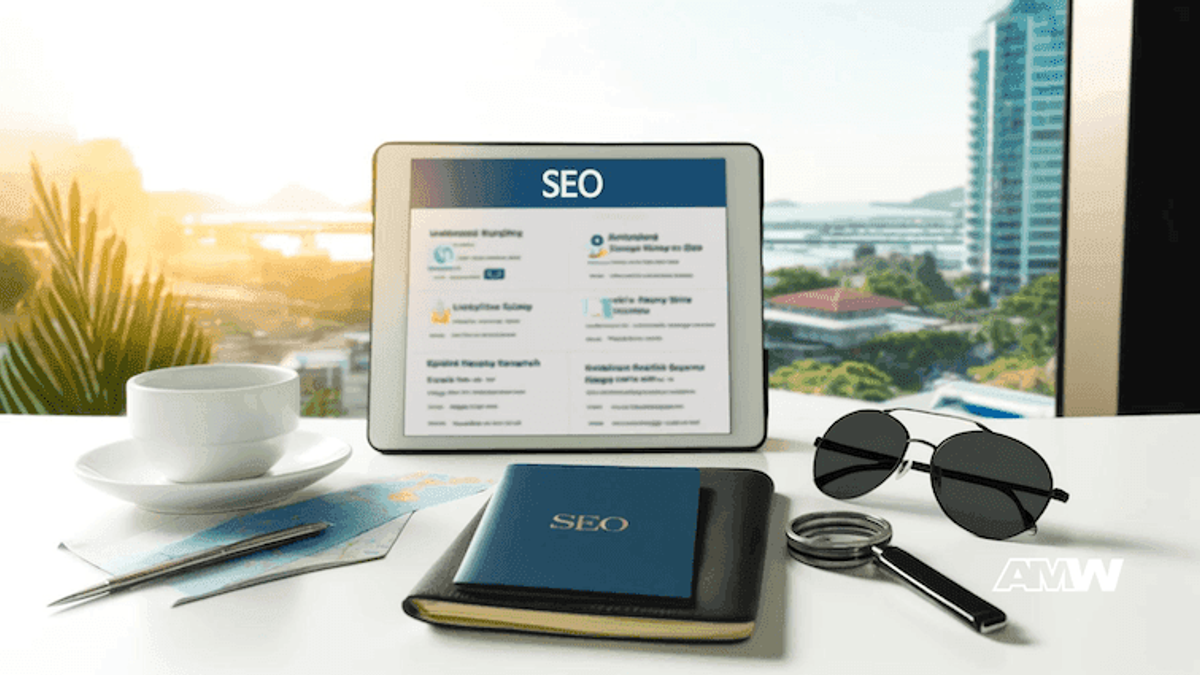Proven Travel SEO Strategies and Tips for Better SERP Rankings

The visibility of your business online is essential for attracting customers in the highly competitive travel industry. This is where travel SEO (Search Engine Optimization) comes into play.
Quick Summary
In the competitive travel industry, travel SEO is crucial for increasing online visibility, attracting organic traffic, and converting visitors into customers. This involves optimizing website content with relevant keywords, leveraging local SEO, and creating high-quality, engaging content. Unique to travel SEO is the emphasis on niche keywords and dynamic updates to reflect industry trends. Additionally, obtaining quality backlinks and utilizing tools like Google Analytics for ongoing performan
SEO for travel websites involves optimizing your web pages to improve search engine rankings, making it easier for users to find your travel services when they search online. Effective SEO can significantly increase your site traffic, enhance your web presence, and drive more bookings and inquiries for your travel business.

When you search for something online, the pages that respond to your search are called Search Engine Results Pages (SERPs). Appearing on the first page of these results is vital for any travel website, as higher rankings lead to greater visibility and higher chances of attracting organic traffic.
Ready to Grow Your Business?
Get a custom strategy tailored to your goals.
To stay ahead of the competition, it's important to understand how engines rank sites and how to optimize your site for better rankings.
Understanding Travel SEO

Travel SEO optimizes a travel website to rank higher on search engine results pages (SERPs). This involves using keywords, creating content, and ensuring the site meets search guidelines.
The primary goal is to enhance the site's online visibility, attract organic traffic, and convert visitors into customers. An effective SEO strategy is essential for travel companies to stand out and reach potential clients actively searching for travel services.
The Role of Search Engines in the Travel Industry
Search engines play a role in the travel industry by connecting users with relevant travel information, services, and providers.
When users search for travel-related terms, engines use algorithms to decide what is most appropriate. By optimizing for travel SEO, businesses can ensure their web pages appear prominently in search results, increasing the likelihood of attracting interested travelers.
Key Differences Between General SEO and Travel SEO

While the principles of SEO apply across all industries, travel SEO has unique considerations. One key difference is the focus on travel-specific search terms and long-tail keywords that target niche markets and specific travel needs.
Travel SEO often requires a more dynamic content marketing strategy, including frequent updates to reflect seasonal trends and travel-related events.
Travel websites must also prioritize local SEO to capture local search intent, optimize Google Business Profiles for better local visibility, and leverage user-generated content such as reviews and social media posts.
Furthermore, the travel industry benefits significantly from quality backlinks from reputable sites, such as travel blogs, tourism boards, and other relevant sources. Building links and obtaining quality backlinks are essential components of a robust SEO campaign for travel businesses.
Travel SEO is integral to any travel company's successful marketing strategy. By understanding the nuances of SEO within the travel industry, businesses can implement proven techniques to improve their rankings, increase web traffic, and ultimately boost their bottom line.
Keyword Research and Strategy

In the travel industry, finding the right keywords to improve your website and show up better in search results is important. The right keywords are the words and phrases that potential customers use when they look for travel services.
These keywords help search engines understand and match your site's content with user search. By focusing on the most relevant keywords, travel companies can attract targeted traffic and increase the likelihood of converting visitors into customers.
Tools and Techniques for Effective Keyword Research
Good keyword research is vital for a successful travel SEO strategy. Tools like Google Keyword Planner can find keywords that have been searched for a lot but don't have too much competition.
These provide valuable insights into the search terms your target audience uses, enabling you to tailor your content accordingly. Google Analytics is also essential for tracking the performance of your keywords and refining your strategy over time.
Utilizing Long-Tail Keywords to Target Niche Markets

Long-tail keywords are longer phrases users will likely use closer to purchasing or looking for a particular service.
For travel websites, targeting long-tail keywords can effectively reach niche markets and increase organic traffic.
Examples include "luxury eco-friendly resorts in Bali" or "family-friendly ski resorts in Colorado."
These specific terms often have lower competition and higher conversion rates, making them valuable additions to your keyword strategy.
Developing a Comprehensive Keyword Strategy
A keyword strategy involves more than just identifying relevant keywords. It requires understanding the search intent behind these keywords and creating content that meets the needs of your target audience.
This includes optimizing meta tags, meta descriptions, page titles, and internal links with your target keywords. Additionally, regularly updating your content and incorporating seasonal keywords can help maintain your site's relevance and improve SEO rankings.
On-Page SEO Optimization

Meta Titles and Descriptions
Meta titles and descriptions are elements of on-page SEO. They are the first things users see in search results, significantly influencing click-through rates.
Creating relevant meta titles and descriptions that include keywords can help improve your site's visibility and attract more visitors. Ensure they reflect the content of your pages and provide a clear value proposition to potential customers.
Optimizing Content with Target Keywords

Incorporating target keywords naturally into your content is essential for on-page SEO. This means using keywords in headings, subheadings, and your content's body without keyword stuffing.
Quality content that addresses the needs and interests of your audience will perform better in search results.
SEO experts recommend focusing on creating in-depth content that provides valuable information and answers the queries of your potential customers.
Importance of High-Quality, In-Depth Content for Travel Websites
High-quality, in-depth content is a cornerstone of effective travel SEO. Travel websites should provide comprehensive guides, detailed itineraries, and insightful blog posts that engage readers and keep them on your site longer.
This improves UX and signals to SERPs that your website is authoritative, boosting your rankings.
Structuring Web Pages for Better Readability and SEO Performance
A well-structured website is more accessible to users and search engines. To improve readability, please use clear headings, bullet points, and short paragraphs.
Properly structured web pages improve user experience and positively impact your SEO performance. Make sure your website is easy to navigate, with a logical flow that guides users to the information they seek.
Internal Linking Strategies to Boost SEO

Internal links connect different pages, helping users and search engines find related content. A strategic internal linking structure can distribute page authority throughout your site, improving the SEO of individual pages.
Use internal links to guide visitors to high-value pages, such as service pages or blog posts, and to keep them engaged with your content longer. This can help increase traffic, improve rankings, and drive more conversions.
By implementing these proven strategies, travel businesses can optimize their sites for better rankings, attract organic traffic, and achieve greater online visibility.
Technical SEO for Travel Websites

In today's digital landscape, ensuring your mobile-friendly and responsive travel website is crucial for SEO success. Mobile-friendliness is a critical factor in Google's search engine rankings, as a significant portion of web traffic comes from mobile devices.
Flexible design ensures your website adapts to all screen sizes, providing a positive user experience. Travel businesses should prioritize mobile optimization to meet customer needs and improve search engine rankings.
Site Speed and Performance
Site speed is another aspect of technical SEO. Fast-loading websites provide a better user experience and reducing bounce rates.
Optimizing your site for speed can lead to better search results. Techniques to improve site speed include optimizing images, leveraging browser caching, and minimizing HTTP requests. Regularly monitoring site performance with tools like Google Analytics can help identify areas for improvement.
Utilizing Schema Markup for Better Search Engine Understanding
Schema markup is microdata that helps search understand the content of your pages. Adding schema markup to your travel site can enhance your optimization efforts and improve your rankings.
Schema markup can give additional information in search results, such as star ratings, event dates, and other relevant details.
Ensuring Proper URL Structure and Navigation
A well-organized URL structure and straightforward navigation are essential for users and search engines. URLs should be descriptive and include keywords to provide context about the page's content.
Proper navigation ensures that users can easily find the information they seek, improving their overall experience on your site. A logical URL structure also helps crawl and index your pages, contributing to better SEO rankings.
Content Marketing Strategies

Content marketing is a vital component of travel SEO. Creating engaging blog posts can attract your audience, driving organic traffic to your travel website.
Blog posts should be well-researched, provide valuable insights, and address the needs and interests of your readers.
User-Generated Content and Reviews
Ready to Grow Your Business?
Get a custom strategy tailored to your goals.
UGC, such as reviews and testimonials, plays a significant role in the travel industry. Encourage positive reviews on Google Business Profile and other platforms to build trust and improve SEO rankings.
Leveraging Social Media for Content Distribution and SEO
Social media is for content distribution and can significantly boost your SEO efforts. Sharing your blog posts, travel guides, and other content on social media can give more traffic to your site.
Social media also provides opportunities for engagement, allowing you to connect with your audience and build a loyal following. Integrating social media into your strategy can enhance your online presence and contribute to better search engine rankings.
Crafting Content That Meets Search Intent and User Needs

Understanding and meeting search intent is crucial for creating compelling content. Making content that directly answers the needs and questions of your target audience can enhance user satisfaction and improve your SEO rankings.
Use keyword research to identify and incorporate standard search terms into your content. Ensure your content is comprehensive and informative and answers users' queries.
By implementing these technical SEO and content marketing strategies, travel businesses can enhance online visibility, attract more potential customers, and achieve better search engine rankings.
A well-rounded SEO strategy that includes mobile optimization, site speed improvements, schema markup, and quality content will position your travel website for success in the competitive travel industry.
Link Building and Off-Page SEO

The Role of High-QualityBacklinks in SEO
High-quality backlinks are essential for improving your travel website's SEO performance. Backlinks act as endorsements from other websites, signaling that your content is valuable and trustworthy. Backlinks from reputable websites can significantly enhance your search engine rankings and increase your site's authority.
For travel businesses, obtaining high-quality backlinks is crucial for achieving better online visibility and attracting more potential customers.
Strategies for Earning Backlinks from Reputable Websites
Earning backlinks from reputable websites requires a strategic approach. Focus on creating high-quality, valuable content that other sites will want to link to.
This could include in-depth travel guides, insightful blog posts, and unique travel experiences. Building relationships with industry influencers and other travel websites can lead to natural backlink opportunities.
Reach out to travel bloggers, tourism boards, and industry publications to showcase your content and request backlinks.
Guest Blogging and Partnerships with Other Travel Sites
Guest blogging is a good strategy for earning backlinks and increasing your online presence. By writing guest posts for reputable travel blogs, you can establish yourself as an authority in the travel industry. Partnering with other travel sites for content collaborations and link exchanges can also be beneficial.
These partnerships help you build inbound links while providing valuable content to different platforms, creating a win-win situation for both parties.
Importance of Social Signals and Online Presence
Social signals, can indirectly impact your SEO rankings. An active and engaged online presence on social media can drive more traffic to your travel site and increase the likelihood of earning backlinks. Share your content, engage, and encourage them to share your posts.
A solid social media strategy complements your SEO efforts and enhances overall digital marketing.
Local SEO for Travel Businesses

Optimizing Google Business Profile for Local Search
Optimizing your Google Business Profile is crucial for improving local SEO and attracting nearby customers.
Ensure your profile is complete and accurate. Add relevant keywords, and select appropriate categories that reflect your services.
Update your profile with new photos, posts, and special offers to keep it engaging and informative. A well-optimized Google Business Profile can significantly improve your visibility in local search results.
Importance of Local Citations and Directories
Local citations, play a vital role in local SEO. Ensure your travel business is listed on relevant local directories, tourism websites, and review platforms.
Consistent and accurate information across all citations helps search engines verify your business's legitimacy and improve your local search rankings. Focus on acquiring citations from reputable websites to boost your online credibility.
Strategies for Targeting Local Keywords and Search Terms
Targeting local keywords and search terms is essential for attracting traffic to your travel website.
Conduct keyword research to find terms that potential customers in your area use. Use these keywords into your content, meta tags, and Google Business Profile.
Examples of local keywords include "best travel agency in " or "tour operators near ." Tailoring your SEO strategy to local search intent can increase your chances of conversion.
Gathering and Managing Local Reviews
Positive local reviews can significantly enhance your travel business's reputation and improve your local SEO. Encourage happy customers to leave reviews.
Ready to Grow Your Business?
Get a custom strategy tailored to your goals.
Respond to reviews to show that you value feedback and are committed to providing excellent service. Managing reviews effectively can build trust with potential clients and influence their decision-making.
By implementing these link-building and local SEO strategies, travel businesses can enhance their online visibility, attract more potential customers, and achieve better search engine rankings.
A comprehensive SEO strategy that includes earning high-quality backlinks, optimizing for local search, and maintaining a solid online presence will position your travel website for long-term success.
Analyzing and Adjusting Your SEO Strategy

Utilizing Google Analytics to Track SEO Performance
Google Analytics is a tool for monitoring the performance of your travel SEO efforts. You can get valuable insights into how well your SEO strategy works by analyzing website traffic, user behavior, and conversion rates.
Track organic traffic, bounce rates, and average session duration to identify areas for improvement. Additionally, Google Analytics can help you understand which pages and keywords drive the most traffic, allowing you to refine your SEO strategy.
Monitoring Keyword Rankings and Search Volume
Regularly monitoring your keyword rankings and search volume is crucial for improving your rankings. Tools like Google Search Console, SEMrush, and Ahrefs can help you track the performance of your target keywords.
Observing your rankings lets you identify trends and decide which keywords to focus on.
Additionally, monitoring search volume for your relevant keywords helps you understand the demand for specific search terms, enabling you to adjust your keyword strategy accordingly.
Adjusting Strategies Based on Data and Performance
Data-driven decision-making is essential for effective SEO. Analyze the data from Google Analytics to identify what works and doesn't. If specific keywords or pages are underperforming, consider updating the content, optimizing meta tags, or improving the internal linking structure.
Adjust your SEO strategies to ensure you are continually optimizing for better search engine rankings. Regularly reviewing and refining your SEO strategy will help you stay ahead of the competition.
Importance of Ongoing SEO Maintenance and Updates
Search engine algorithms and guidelines constantly evolve; staying updated is crucial for maintaining your rankings. Update your content to keep it relevant and accurate, and ensure your website remains technically sound by conducting periodic SEO audits.
Continuous link-building and content marketing efforts are necessary to sustain and improve online visibility. Ongoing SEO maintenance ensures that your travel website performs well in search results.
Conclusion

In conclusion, a comprehensive travel SEO strategy is essential for improving your rankings and attracting more potential customers.
Travel businesses can improve their online visibility and drive more organic traffic by focusing on keyword research, on-page optimization, technical SEO, content marketing, link building, and local SEO. Regularly analyzing and adjusting your SEO strategies is crucial for sustained success in the competitive travel industry.
By following these proven strategies and SEO tips, your travel website can achieve better search engine results page rankings, increase traffic, and boost your business's bottom line.
Embrace these techniques and make SEO a core part of your strategy to ensure long-term growth and success.
FAQ

What is Travel SEO, and why is it important?
Travel SEO involves optimizing a travel website to improve its visibility, which is crucial for attracting potential customers and increasing bookings.
How do I choose relevant keywords for my travel website?
Use keyword research tools to find KWs with high search volume and low competition pertinent to your travel services and target audience.
What are long-tail keywords, and why should I use them?
Long-tail keywords are specific phrases that attract niche audiences. They are less competitive.
How can I optimize my travel website for local SEO?
Optimize your Google Business Profile, use local keywords, get listed in directories, and encourage customer reviews to improve local SEO.
What are the benefits of quality backlinks for my travel site?
Quality backlinks from reputable websites can boost your site's authority, get better rankings, and drive more organic traffic.
How can Google Analytics help me with my SEO strategy?
Google Analytics provides insights into your website's traffic, user behavior, and keyword performance, helping you make data-driven decisions to improve SEO.
Why is content marketing important for travel SEO?
Content marketing helps attract potential customers, improves search engine rankings, and establishes your travel business as an authority in the industry.
What are the best practices for on-page SEO for travel websites?
Use relevant keywords in meta titles, descriptions, and headers, create high-quality content, optimize images, and ensure a clear site structure and internal linking.

Ready to Grow Your Business?
Get a custom strategy tailored to your goals.
Frequently Asked Questions
What is travel SEO and how does it differ from general SEO strategies?
Travel SEO is the process of optimizing travel websites to rank higher on search engine results pages (SERPs) using industry-specific techniques. Unlike general SEO, travel SEO focuses on travel-specific keywords, seasonal content updates, local SEO optimization, and dynamic content strategies. It emphasizes long-tail keywords for niche markets, requires frequent content updates for seasonal trends, prioritizes Google Business Profile optimization, and relies heavily on user-generated content like reviews and social media posts from travelers.
How do you find the best keywords for travel website optimization?
Use keyword research tools like Google Keyword Planner and Google Analytics to identify high-volume, low-competition keywords relevant to your travel services. Focus on long-tail keywords that target specific travel needs, such as 'luxury eco-friendly resorts in Bali' or 'family-friendly ski resorts in Colorado.' Analyze search intent behind keywords and incorporate seasonal terms. These specific phrases often have lower competition, higher conversion rates, and attract more qualified traffic to your travel website.
What are the most important on-page SEO elements for travel websites?
The key on-page SEO elements include optimized meta titles and descriptions with target keywords, high-quality in-depth content like comprehensive travel guides, proper keyword integration in headings and body text, strategic internal linking between related pages, and well-structured web pages with clear headings and bullet points. Focus on creating valuable content that answers traveler questions, improves user experience, and keeps visitors engaged longer, which signals authority to search engines.
How can long-tail keywords improve travel website rankings and conversions?
Long-tail keywords are specific phrases users search for when closer to making travel decisions, making them highly valuable for conversions. Examples include 'romantic honeymoon destinations in Italy' or 'budget backpacking hostels in Southeast Asia.' These keywords typically have lower competition, attract more qualified traffic, and target niche markets effectively. They help travel websites rank for specific services and destinations while capturing users with clear travel intent, leading to higher booking rates.
Why is mobile optimization crucial for travel website SEO performance?
Mobile optimization is critical because Google uses mobile-first indexing and a significant portion of travel searches occur on mobile devices. Travelers frequently search for accommodations, flights, and activities while on-the-go. A mobile-friendly, responsive design ensures your website adapts to all screen sizes, improves user experience, reduces bounce rates, and maintains fast loading speeds. Poor mobile performance can severely impact your search rankings and lose potential bookings from mobile users.
What role does local SEO play in travel business marketing strategies?
Local SEO is essential for travel businesses to capture location-based searches and attract nearby customers. It involves optimizing Google Business Profiles, targeting location-specific keywords, encouraging customer reviews, and creating content about local attractions and services. Travel companies benefit from appearing in 'near me' searches, local map results, and destination-specific queries. Strong local SEO helps hotels, tour operators, and travel agencies connect with tourists searching for services in specific cities or regions.
How do you create an effective internal linking strategy for travel websites?
Create internal links that connect related travel content, such as linking destination guides to accommodation pages, or blog posts to relevant service pages. Use descriptive anchor text with target keywords, distribute page authority throughout your site, and guide visitors to high-value conversion pages. Link seasonal content to evergreen pages, connect related destinations, and create clear navigation paths. This strategy keeps users engaged longer, improves page rankings, and helps search engines understand your site structure and content relationships.
Related Resources
Calculators
Pricing Guides
Key Terms
Optimization of individual web page elements including content, HTML source code, and meta tags to rank higher in search results.
Keyword DifficultyA metric estimating how hard it would be to rank on the first page of search results for a specific keyword.
Content DecayThe gradual decline in organic traffic and rankings that content experiences over time as it becomes outdated or outranked.
Brand SalienceThe degree to which your brand comes to mind quickly and easily when customers think about your product category.
Answer Engine OptimizationOptimizing content for AI answer engines and conversational search interfaces.
Related Articles

Expert SEO Tips for Higher Rankings in Search Results
SEO is the backbone of online visibility. It ensures that your site appears in search when customers look for relevant keywords. Without effective SEO, even the most well-designed website can remai

Onsite SEO vs Offsite SEO: Strategies for Optimization
Planning an effective search engine optimization strategy often involves a well-balanced approach to both onsite and offsite SEO. Each element can contribute significantly to improving search engine r

Local SEO - A Comprehensive Guide for 2026
The ability for a business to stand out online has never been more crucial. Local SEO emerges as a beacon of opportunity, offering businesses a powerful tool to survive and thrive. Local SEO, or s